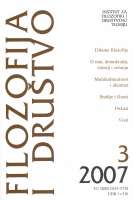Da li je Faust bio „Otporaš“? O subjektivističkom objektivizmu i objektivističkom subjektivizmu u interpretaciji (post)modernih društvenih i politički
Was Faust a Member of “Otpor”? On Subjectivistic Objectivism and Objectivistic Subjectivism in the Interpretation of (Post)Modern Social and Political
Author(s): Slobodan NaumovićSubject(s): Politics / Political Sciences
Published by: Institut za filozofiju i društvenu teoriju
Keywords: Otpor; electoral revolution; democratisation; political synergy; nonviolent resistance; hope as a political category;
Summary/Abstract: The paper represents an attempt to channel polemical exchanges concerning the process of democratisation in Serbia into the frames of scientific dialogue, which is considered here to be a more productive genre of scientific communication than are polemics. The most important issue addressed concerns providing adequate theoretical explanations of the “revolution of October the 5th” and of the roles that the student/popular movement “Otpor” played in it. According to the thesis defended by the author, the models of “waves of democratisation” and of “electoral revolution” offer an adequate theoretical frame for the discussion of such problems. Among the questions that are addressed in the paper are the following: how much can relying on external sources blur the understanding of local processes; what is the difference between “exported/imported” and “electoral revolutions”; how should one situate the Serbian “October revolution” in the waves of postcommunist democratisation; what are the particularities of the Serbian electoral revolution compared to other “coloured revolutions”; how should the respective roles of external and internal players in the Serbian case be evaluated; what are the particularities of projects of democratisation based on synergy as opposed to those based on hierarchy and relations of rower; what binds together the strategy of non-violent resistance, proactive politics and Otpor’s “Plan B”; finally, can a direct link between the amount of foreign assistance and the degree of loss of control over the results of political reform be presupposed. In the final section, offered is an assessment of the negative and positive aspects of Otpor’s political legacy, as well as an attempt to link this legacy with an understanding of the “dynamics of hope” as a political project on which Otpor worked systematically.
Journal: Filozofija i društvo
- Issue Year: 2007
- Issue No: 34
- Page Range: 117-149
- Page Count: 29
- Language: Serbian

